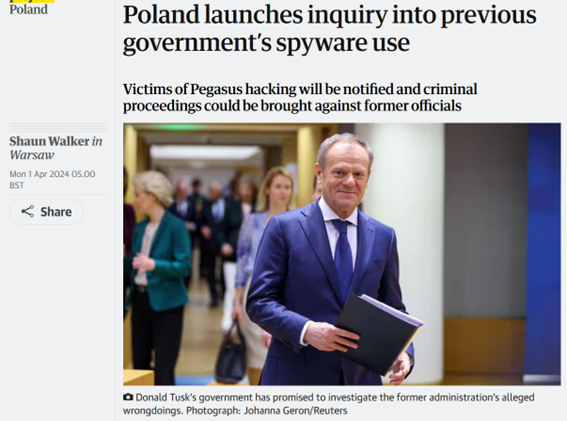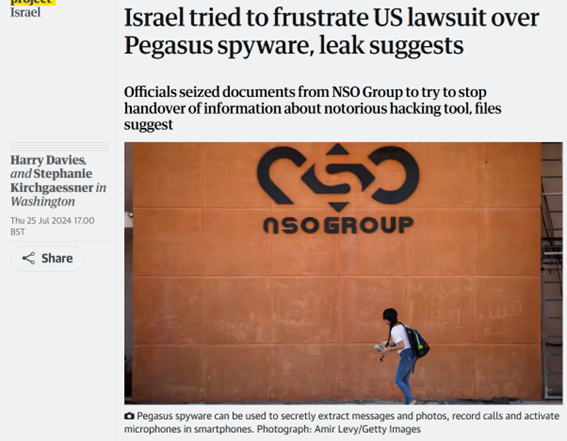
Image by cocoparisienne on Pixabay .
By James Myers
With the continued proliferation of sophisticated cyberthreats targeting individuals, governments and organizations, the work of journalists and digital watchdogs like The Citizen Lab are increasingly important for public protection.
An example of this work with ongoing public benefit is the three-year-old investigation by seventeen news organizations into human rights abuses committed with spyware called Pegasus. The investigation has been aided by the research of The Citizen Lab.
Launched in 2021 by The Guardian, Washington Post, and fifteen other journalism organizations under the banner of the Forbidden Stories Network, the Pegasus Project has revealed the use of Pegasus spyware by some governments for numerous violations of human rights, including tracking journalists and suppressing dissidents and activists. The investigation triggered lawsuits by Apple and WhatsApp owner Meta against NSO Group, which makes and markets Pegasus.

April 2024 Headline from The Guardian’s continuing Pegasus Project investigation.
The Pegasus Project has been supported by the investigative expertise of The Citizen Lab, a research facility located at the University of Toronto’s Munk School of Global Affairs & Public Policy. Since Citizen Lab’s first report on Pegasus in 2016, the organization has published extensive reports on its work to identify the existence and sources of Pegasus spyware on devices of targeted individuals and organizations.
Israel-based NSO Group markets Pegasus to foreign governments, whose agents can install the software remotely on devices operating Apple’s iOS and Google’s Android without the users’ knowledge or requiring the user to click on a link. The spyware provides NSO clients with full access to the infected device’s camera, microphone, messages, and passwords.
According to the Washington Post, the Israeli government classifies Pegasus as a weapon and its approval is required for exports of the spyware to foreign governments.
Amnesty International has reported many cases of Pegasus-enabled surveillance against human rights activists, political leaders, journalists, and lawyers. Access Now, a global organization whose mission “defends and extends the digital rights of people and communities at risk,” has partnered with Citizen Lab in numerous investigations of Pegasus abuses.
In the first three years of the Pegasus Project, worldwide concern has resulted in measures by the U.S. and other governments to curtail the spyware application’s reach. Citing national security concerns, in late 2021 the U.S. government banned NSO Group from doing business with Americans. Citizen Lab director Ron Diebert told the Washington Post last month that “NSO Group is on the ropes, no longer the only firm in town, and nowhere near as formidable as they once were.”
With its powerfully invasive capabilities, Pegasus is marketed as a tool to fight crime and terrorism. NSO Group’s website claims that the company “is proud to set a model for good corporate governance in the cyber intelligence industry. Our governance framework codifies NSO’s commitment to ethical business by building human rights into all aspects of our work – from the design to the licensing of our products. At NSO, we are dedicated to ensuring licensed customers use our products only for their lawful and necessary purposes of preventing and investigating terrorism and serious crime.”
The power of Pegasus places a significant responsibility on its manufacturer as well as the Israeli government in its export reviews and approvals of the spyware. There is, however, no disclosure on NSO’s website of the company’s leaders, owners, and members of its Governance, Risk and Compliance Committee. An undated statement on the company’s website indicates, “More information about the Governance, Risk and Compliance Committee will be published as it is implemented over the coming months,” but no such documentation was found as of early October 2024.

July 2024 headline from The Guardian’s continuing Pegasus Project investigation.
This July, The Guardian reported that “Israeli officials seized documents about Pegasus spyware from its manufacturer, NSO Group, to prevent the company from being able to comply with demands made by WhatsApp in a US court to hand over information about the invasive technology.” While WhatsApp’s legal action continues, last month Apple dropped its lawsuit against NSO, claiming that the document seizure has made necessary evidence unavailable and that Apple’s disclosures on how it detected the iOS hacking could aid NSO and rivals.
Protecting the public against abuses enabled by increasingly sophisticated technology is the role of digital watchdogs and is central to the mission of The Citizen Lab.
Since its inception in 2001, Citizen Lab’s peer-reviewed work has focused on researching and documenting controls over information that affect human rights and the openness and security of the Internet. In addition to its work on specific digital espionage cases like Pegasus spyware, the lab has researched the methods employed by governments and commercial interests to censor the Internet, social media, and mobile applications.
Applying an interdisciplinary approach that includes law, computer science, and political science, Citizen Lab is an independent organization not aligned with government or commercial interests. While it receives some public funding from, for example, the Social Sciences and Humanities Research Council of Canada, a significant source of financial support includes private non-profit and charitable foundations like the John D. and Catherine T. MacArthur Foundation, Ford Foundation, and the Donner Canadian Foundation.
Citizen Lab was founded by its current director, Political Science Professor Ron Deibert. Deibert has overseen and contributed to more than 170 widely-cited reports and was the author of the acclaimed 2013 book Black Code: Surveillance, Privacy and the Dark Side of Cyberspace which was the subject of a 2016 feature documentary.
Deibert was appointed to the Order of Canada in 2022 “for his leadership and expertise in digital technology, security and human rights, and for his groundbreaking contributions to cyber security around the globe.” His latest book, Chasing Shadows: Cyber Espionage, Subversion, and the Global Fight for Democracy, is set for release in February 2025 and will provide an account of how Citizen Lab uncovered dozens of cyber espionage cases in countries around the world.
In the twenty-three years since its founding, Citizen Lab’s work has been widely cited. Among its particularly noteworthy accomplishments was China’s Great Cannon report in 2015, which analyzed a tool used in China for large-scale distributed denial-of-service (DDoS) attacks to disable internet access of targeted individuals and organizations. A collaboration with Princeton University and UC Berkeley, the report was front-page news in the New York Times.

Citizen Lab’s research has four main areas of concern: targeted threats (deployed, for example, with digital espionage tools like Pegasus), freedom of online expression, transparency and accountability over government and corporate use of personal data, and privacy and security controls in popular apps.
The lab’s recent reports include Rivers of Phish, issued in August 2024 in collaboration with Access Now, detailing a sophisticated spear phishing campaign targeting civilians in Russia and elsewhere. The campaign uses sophisticated impersonation techniques to gain access to users’ online accounts and has been attributed to the Russian Federal Security Service by the U.S. government and its Five Eyes partners, Canada, Australia, New Zealand, and the U.K.
“The Five Eyes is an intelligence alliance composed of Australia, Canada, New Zealand, the United Kingdom and the United States. These partner countries share a broad range of intelligence with one another in one of the world’s most unified multilateral arrangements” (Government of Canada).
In February 2024, Citizen Lab published its report entitled Paperwall, describing the activities of at least 123 Chinese websites posing as local news outlets to target global audiences in 30 countries with content favourable to the government of China. The hidden agenda of the websites was investigated in late 2023 by an Italian newspaper and the National Cyber Security Center, an agency of the South Korean government.
Protecting the public from the increasing global scope of cyber security threats requires continued vigilance by journalists and digital watchdogs.
It is increasingly rare that a government, business, or individual can escape cyberthreats or has not already suffered from the actions of cybercriminals. Moreover, recent research from the World Economic Forum highlights a significant lack of confidence among organizations regarding cybersecurity. Only 4% of organizations surveyed believe they can effectively protect users of connected devices and related technologies from cyberattacks.
The non-partisan and non-profit Center for Strategic & International Studies maintains a lengthy list of global significant cyber incidents since 2006 involving financial crimes and attacks against government agencies and companies in the military and technology industries. Governments are introducing new measures to combat cyberthreats, including the U.K. government’s pending introduction of a Cyber Security and Resilience Bill next year and the European Union’s December 2023 introduction of strengthened cybersecurity standards for its institutions, agencies, and offices.
The technological complexities underlying invasive technological applications like Pegasus, and their ability to infiltrate devices leaving little or no traces for detection, place the public, public institutions, and businesses at high risk for privacy theft and financial loss. The investigative work of journalists, The Citizen Lab, and other digital watchdogs in exposing the methods and actors behind cyberthreats provides a crucial first line of defence against abuses of powerful technology.
Craving more information? Check out these recommended TQR articles:
- Editing Our Human Selves: Will Quantum Computing’s Potential Increase the Risks or the Benefits?
- Trust is Fragile: Google’s Antitrust Loss and the Global Windows Failure in July are Warnings to AI Investors About the Future Value of Trust
- Deep Underground Lab Studies Effects of Cosmic Rays on Quantum Bits
- Race for Post-Quantum Cryptography: Will Proposed Encryption Standards Secure the World’s Data?
- Breakthrough in Error Correction Opens Potential for Large-Scale Quantum Computer Processing
- The Future of Quantum Computing Accelerates, Many Qubits at a Time
Your feedback helps us shape The Quantum Record just for you. Share your thoughts in our quick, 2-minute survey!
☞ Click here to complete our 2-minute survey




